科普版六年级上册英语第7.8课复习
科普版小学六年级英语上册lesson7lesson8教案
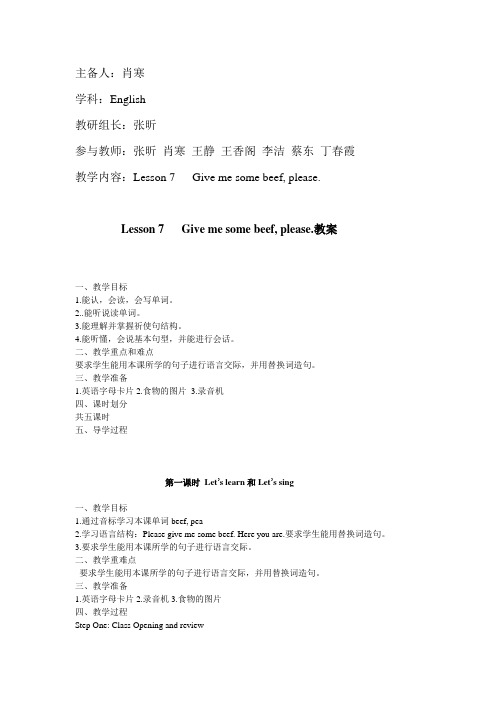
主备人:肖寒学科:English教研组长:张昕参与教师:张昕肖寒王静王香阁李洁蔡东丁春霞教学内容:Lesson 7 Give me some beef, please.Lesson 7 Give me some beef, please.教案一、教学目标1.能认,会读,会写单词。
2..能听说读单词。
3.能理解并掌握祈使句结构。
4.能听懂,会说基本句型,并能进行会话。
二、教学重点和难点要求学生能用本课所学的句子进行语言交际,并用替换词造句。
三、教学准备1.英语字母卡片2.食物的图片3.录音机四、课时划分共五课时五、导学过程第一课时Let’s learn和Let’s sing一、教学目标1.通过音标学习本课单词beef, pea2.学习语言结构:Please give me some beef. Here you are.要求学生能用替换词造句。
3.要求学生能用本课所学的句子进行语言交际。
二、教学重难点要求学生能用本课所学的句子进行语言交际,并用替换词造句。
三、教学准备1.英语字母卡片2.录音机3.食物的图片四、教学过程Step One: Class Opening and review1.Greeting.(用学过的问候语来和学生打招呼.)[课始简单的问候可以培养学生的语感,使他们自然地处于英语学习的环境中]2.Sing a song:[用学生学过的歌曲来进行课前热身,在视觉和听觉上给学生以美的享受,使学生快乐地进入英语学习的状态。
在此也复习了一些关于食物的单词,为本课的学习奠定了基础。
] 3.Review the words:出示一些关于以下食物的图片fish,chicken,pork,bun, bread,vegetables...让学生说出其名称,并分别用这些词造句,比如:Please have some fish. I’d like some buns. Would you like a tomato?等Step Two:导入新课1.Learn new words:beef, pea(1)(出示beef和peas 的图片,让学生先说出汉语意思,然后根据音标把单词读出来,教师领读几遍)[这样让学生通过音标来学习单词,既可以复习音标,又可以让学生清楚单词中字母的发音,让学习做到听其音,知其形。
新外研版六年级上册英语 Module 7和 Module 8知识清单
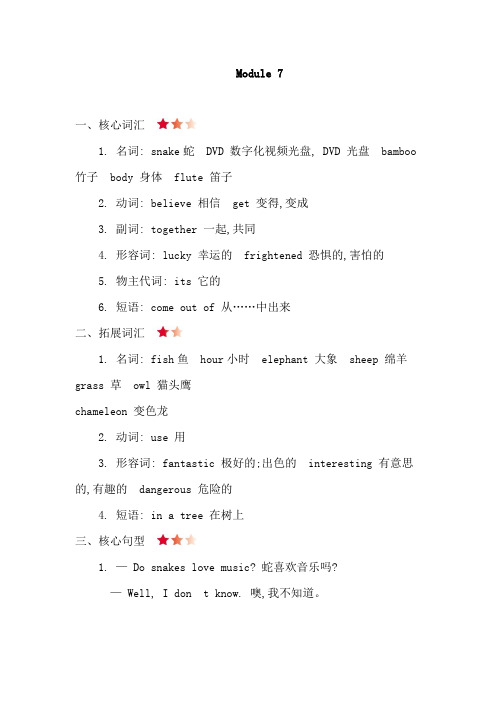
Module 7一、核心词汇1. 名词: snake蛇DVD 数字化视频光盘, DVD 光盘bamboo 竹子body 身体flute 笛子2. 动词: believe 相信get 变得,变成3. 副词: together 一起,共同4. 形容词: lucky 幸运的frightened 恐惧的,害怕的5. 物主代词: its 它的6. 短语: come out of 从……中出来二、拓展词汇1. 名词: fish鱼hour小时elephant 大象sheep 绵羊grass 草owl 猫头鹰chameleon 变色龙2. 动词: use 用3. 形容词: fantastic 极好的;出色的interesting 有意思的,有趣的dangerous 危险的4. 短语: in a tree 在树上三、核心句型1. — Do snakes love music? 蛇喜欢音乐吗?— Well, I don t know. 噢,我不知道。
解读:此句是助动词do引导的一般疑问句,用来询问某种动物的生活习性,其时态为一般现在时。
does是do的第三人称单数形式,当主语是第三人称单数时,用助动词does,助动词后跟动词原形。
对此句常见的回答是“Yes, 主语 + do/does.”或者“No, 主语 +don t/doesn t.”。
当对方提出的问题我解答不了时也可以用“I don t know.”回答。
举一反三: — Do your parents like milk? 你的父母喜欢牛奶吗?— Yes, they do./No, they don t. 是的,他们喜欢。
/不,他们不喜欢。
— Does Jim like sports? 吉姆喜欢运动吗?— Yes, he does./No, he doesn t. 是的,他喜欢。
/不,他不喜欢。
2. They love bamboo. 它们喜爱竹子。
解读:此句是描述喜好的句型。
小学英语六年级unit7-unit8讲义
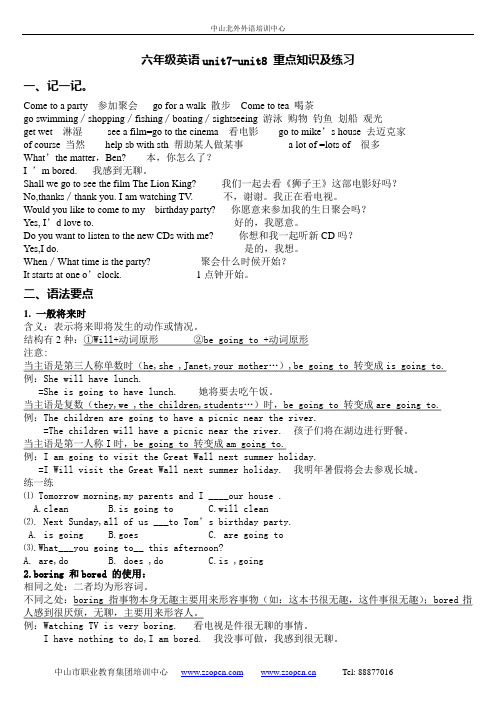
六年级英语unit7-unit8 重点知识及练习一、记一记。
Come to a party 参加聚会go for a walk 散步Come to tea 喝茶go swimming∕shopping∕fishing∕boating∕sightseeing 游泳购物钓鱼划船观光get wet 淋湿see a film=go to the cinema 看电影go to mike’s house 去迈克家of course 当然help sb with sth 帮助某人做某事 a lot of =lots of 很多What’the matter,Ben? 本,你怎么了?I ’m bored. 我感到无聊。
Shall we go to see the film The Lion King? 我们一起去看《狮子王》这部电影好吗?No,thanks∕thank you. I am watching TV. 不,谢谢。
我正在看电视。
Would you like to come to my birthday party? 你愿意来参加我的生日聚会吗?Y es, I’d love to. 好的,我愿意。
Do you want to listen to the new CDs with me? 你想和我一起听新CD吗?Y es,I do. 是的,我想。
When∕What time is the party? 聚会什么时候开始?It starts at one o’clock. 1点钟开始。
二、语法要点1. 一般将来时含义:表示将来即将发生的动作或情况。
结构有2种:①Will+动词原形②be going to +动词原形注意:当主语是第三人称单数时(he,she ,Janet,your mother…),be going to 转变成is going to.例:She will have lunch.=She is going to have lunch. 她将要去吃午饭。
(教科版)六年级英语上册教案 Lesson 7(8)

教科版六年级英语上册六年级英语Unit 7 Oh! That’s My Son!EEC教材六年级上册Lesson7 Oh! That’My Son! 本节课的重点内容是围绕着人的长相、穿着的句式“What does he look like? What’s he wearing?这两个句式进行展开的。
采用多样化的教学手段,将听、说、读、写、玩、演溶于一体,激发学生学习兴趣和愿望,使学生通过合作学习体验荣誉感和成就感从而树立自信心。
发展自主学习的能力,形成用英语进行简单的日常交际能力。
结合新课标和大纲对英语提出的总体目标和具体要求我将本课教学目标设计如下:知识目标:让学生学会并熟练应用描述人物的外貌特征和穿着的句型。
What does he/she look like?He/she has…What’s he wearing?He is wearing…这两个句式。
能力目标:培养学生综合运用语言的能力。
情感目标:通过活动、游戏使学生产生学习英语的兴趣,让学生敢于、乐于开口,积极参与交流并让学生在学习的过程中,培养他们的合作意识和竞争意识。
教学过程:1. 新课导入,为了激发学生的学习兴趣,拉近师生距离,采用唱英文歌的形式边做动作边唱,以此活跃课堂气氛。
2.创设教师书丢了的情况,引出About half an hour ago“半小时以前”这一句式。
3.放录音,让学生整体感知本课的内容。
4.做五官变化的游戏,根据人的五官变化使学生正确判断出人的外貌特征激发学生的兴趣。
5.通过学习人物穿着的表达方式,结合庞龙的图片是学生更好的运用What’s he wearing?He is wearing is….的句式。
6.采用做游戏的方式,让孩子们成为课堂的主体,激发学生学习兴趣,同时巩固学生所学的知识。
7. 归纳总结在老师的引导下让学生来总结本课所学的知识,锻炼学生归纳总结的能力。
8.音乐图片欣赏。
让学生在一个轻松愉悦的环境中感受描述人的特征和穿着的句式。
科普版-英语-六年级上册-六年级英语lesson7:What’s the date today(新科普版)

Name: Mickey Date of Birth: 11.17
Name: Minnie Date of Birth: 11.17
They’re all in November.
你能认读吗?
六月二日:June 2nd 五月二十日:May 20th 四月十五日:April 15th 七月一日:July 1st 八月八日:August 8th
_O_c_tob_e_r ___. 5.Teachers’ Day is in _S_ep_te_m_be_r __.
Christmas Day is in __D_ec_e_mb_e_r __.
April Fool’s Day ( 愚 人 节 )is in __Ap_ri_l ____.
Children’s Day ( 儿 童 节 ) is in _J_un_e_____.
for example
例如
(Let&# today? It's April 30th. Oh, my birthday is coming. When is your birthday ? It's on May 5th. When is your birthday? My birthday is in May, too. Oh, then we're the same age. No, I'm twelve years old. And you're ten
Students
have
summer
holiday( 暑 假 ) Jiunly _____ and
__J_un_e _.
Allhallows( 万 圣 节 ) is in __N_o_ve_m_b_er __.
六年级上册英语书第七课
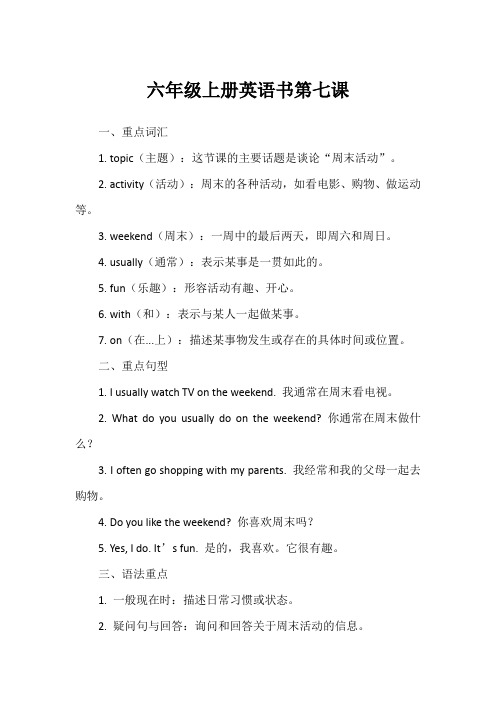
六年级上册英语书第七课一、重点词汇1. topic(主题):这节课的主要话题是谈论“周末活动”。
2. activity(活动):周末的各种活动,如看电影、购物、做运动等。
3. weekend(周末):一周中的最后两天,即周六和周日。
4. usually(通常):表示某事是一贯如此的。
5. fun(乐趣):形容活动有趣、开心。
6. with(和):表示与某人一起做某事。
7. on(在...上):描述某事物发生或存在的具体时间或位置。
二、重点句型1. I usually watch TV on the weekend. 我通常在周末看电视。
2. What do you usually do on the weekend? 你通常在周末做什么?3. I often go shopping with my parents. 我经常和我的父母一起去购物。
4. Do you like the weekend? 你喜欢周末吗?5. Yes, I do. It’s fun. 是的,我喜欢。
它很有趣。
三、语法重点1. 一般现在时:描述日常习惯或状态。
2. 疑问句与回答:询问和回答关于周末活动的信息。
3. 介词使用:如“on the weekend”表示在周末。
四、课后作业1. 写一篇短文,描述你的周末活动计划。
2. 询问你的三个朋友他们的周末活动习惯,并记录下来。
3. 制作一个关于周末活动的海报,包括你喜欢的活动和你不喜欢的活动。
五、家庭作业建议1. 复习本课词汇和句型,尤其是关于周末活动的表达。
2. 尝试与家人或朋友用英语交流关于周末活动的计划或习惯。
六年级上册6A unit7 unit8 期末复习总结词组短语

姓名________ 班级________● 1. protect the Earth 保护地球 2. save water 节约水● 3. use water to clean things 用水洗东西 4. every day 每天● 5. in many places 在许多地方 6. much water 许多水●7. waste water 浪费水8. reuse the water 再利用水●9. most of the energy 大多数能源10. come from 来自●11. save energy 节约能源12. so much 如此多(的)●13. on Earth 在地球上●14. use a lot of energy 使用许多能源●15. use wood to make tables 用木头做桌子●16. make chairs and tables 制作桌椅●17. many other things 许多其他东西18.cut down 砍伐,砍掉●19. too many 太多+(可数名词复数)20. too much + (不可数名称词) ●21. be bad for …对……不好22. paper bags 纸袋●23. glass bottles 玻璃瓶●24. help keep the air clean 帮助保持空气干净●25. collect some paper 收集一些纸●26. plastic bags/bottles塑料袋/瓶●27. reuse these things 再利用这些东西28. all students 所有的学生●29. reuse paper to make a box 再利用纸做一个盒子●30. reuse a plastic bottle to make a toy 再利用塑料瓶做一个玩具●31. Earth Day 地球日on 22nd April 在4月22日●32. World Environment Day 世界环境日on 5th June 在6月5日●33. do a project 做课题34. make a poster 做张海报●35. tell sb about sth 告诉某人有关某事36. start drawing 开始画画●37. look nice 看上去漂亮38. a rubbish bin 一个垃圾桶●39. at the school gate 在学校门口●40. What a nice poster!多么漂亮的一张海报啊!●41. shouldn’t litter不应该扔垃圾42. really cool 真的很酷●43. have fun 玩得开心44. let me do sth 让我来做某事●45. on the tree (水果)在树上46. be ready 准备好●48. every morning/ afternoon 每天早上/ 下午姓名________ 班级________● 1. Chinese New Year = Spring Festival 春节( 前面用介词“at”)● 2. get sth from sb 从某人那里收到/ 得到某物● 3. in Hong Kong在香港● 4. next week下一周last week上一周● 5. in the evening/ afternoon 在晚上/ 下午● 6. have dinner吃晚饭●7. my parents我的父母亲●8. the most important holiday最重要的节日●9.Thanksgiving 感恩节10. cook dumplings煮饺子●11. give sb sth = give sth to sb 把某物给某人●12. after dinner晚饭后●13. talk about谈论●14. a nice cake漂亮的蛋糕●15. at Chinese New Year 在新年●16. on C hinese New Year’s Eve 在除夕●17. on Chinese New Year’s Day 在年初一●18. buy some new clothes and food 买一些新衣服和食物●19. make some cakes and tangyuan 做些蛋糕和汤圆●20. watch fireworks 看烟火●21. watch a lion dance 看舞狮●22. have a big dinner 吃顿大餐●23. on the second day of Chinese New Year在年初二●24. the most important holiday in the UK 在英国最重要的节日●25. the most important festival in China 在中国最重要的节日●26. talk about 谈论●27. plan for sth 为某事作计划/ 打算●27. light some firecrackers and fireworks 点燃一些爆竹和烟火●28. say “ Happy New Year ” to …对…说新年好●29. have a lot of fun 玩得愉快30. in the kitchen 在厨房。
六年级上册英语课件-Lesson 7 课程小结 科普版

的人,路要一步步走,虽然到达终点的那一步很激动人心,但大部分的脚步是平凡甚至枯燥的,但没有这些脚步,或者耐不住这些平凡枯燥,你终归是无法迎来最后的'那些激动人心。一
个人害怕的事,往往是他应该做的事。每个人都会有乐观的心态,每个人也会有悲观的现状,可事实往往我们只能看到乐观的一面,却又无视于悲观的真实。从来没有人喜欢过悲观,也
Children and adults received and gave presents. 孩子和大人接受和赠送礼物。
句型
They don't think 13 is a good number. They don't like to live on the thirteenth floor. 他们认为13不是一个好数字。他们不喜欢住在十三楼。
六年级(上册)
Lesson 7 课程小结
Lesson 7
April /'eɪprəl/ May /meɪ/ year /jɪə/ dinner /'dɪnə/ month /mʌnθ/ night /naɪt/
单词
四月 五月 年 正餐,晚餐 月份 夜晚
பைடு நூலகம்
Lesson 7
单词
date /deɪt/
日期
Let’s read!
句型
Warm September brings the fruit, Sportsmen then begin to shoot. Fresh October brings the pheasant; Then to gather nuts is pleasant. Dull November brings the blast, Then the leaves are falling fast. Chill December brings the sleet, Blazing fire and Christmas treat.
科普版英语六年级上册Lesson7Givemesomebeefplease

科普版英语六年级上册 Lessn7 Give ese beef, pleaseLessn7Giveesebeef,please一Teahingais能认会读,会写单词pass2能听说读单词pea,beef,sup,rd,anther。
3能理解并掌握祈使句结构,并能做替换练习4能听懂,会说大体句型并能进行会话二Teahingaterials:SeEnglishrdards,thetapesandtheradi三Teahingexpressins)u,hatdehavefrsuppertda?2)Duliethe?3)ulduliesees,giveeaae,please4)Passethatplate,THereitis四时划分共四时五Teahingpredures:第一时一:Greetings:Sa:Hiteverne!GdrningtuHareutda?Nieteetu二:arupLetssingasngtgether:Hellsng2Iillassestudentstritetheerdsandesentenesntheblabrd 三:Presentatin图片导入,板书单词Teaher:PALEASELATTHEBLABARD本话题为“食物(fd)”教师通过食物卡片引出本的生词pea,beef,sup!Pleasereadaftere!pea,pea,pea,Giveesepeabeef,beef,beef,Giveesebeef教师把这些单词编成歌谣,领学生边鼓掌边说,直到每位学生都能脱口而出,以闪卡的形式让学生练习。
2导入对话老师用图片导入法导入对话部份,教师指着黑板上的图画问学生hatduhavefrsuppertda?L!Peas,arrts,beefandtatsup学生看到这么多美食后感觉必然很美味。
教师引导学生说“Duliethe?”然后教师放录音,边放录音边在黑板上写关键词。
科普版六年级英语上册 Lesson 7 知识清单

Lesson 7 What’s the date today?一、核心词汇1. 名词:April四月May五月year年dinner正餐,晚餐month月份night夜晚age年龄date日期2. 动词:count数become 成为3. 连词:than比4. 副词:around在周围5. 短语:for example例如have a good time玩得高兴二、了解词汇短语:New Year’s Day元旦Tree Planting Day植树节Teachers’ Day 教师节National Day国庆节Mid-Autumn Festival中秋节Children’s Day儿童节三、核心句型—What’s the date today?今天是几号?—It’s June 2nd.今天是6月2号.解读:问句是一个以what引导的特殊疑问句,用来询问日期.What’s 是what is的缩写.句型结构:What + is + the date + today?回答:It’s+月份+序数词.举一反三:—What’s the date today?今天是几号?—It’s June 25th. 今天是6月25号.—What’s the date today?今天是几号?—It’s May 16th.今天是5月16号.四、了解句型1. So I’m older than you. 所以我比你大.解读:这是一个陈述句,用来对两者进行比较.句型结构:主语+be动词+形容词比较级+than+宾语.举一反三:I am younger than you. 我比你小.She is older than me. 她比我大.2. Where do you come from? 你来自哪里?解读:这是一个由where引导的特殊疑问句,用来询问某人来自哪里.句型结构:Where +助动词+主语+ come from?举一反三:—Where do you come from? 你们来自哪里?—We come from Canada. 我们来自加拿大.3. Mingming always has lunch at twelve o’clock.明明总是在12点吃午饭.解读:这是一个陈述句,表示某人总是做某事.句型结构:主语+always+动词+其他.举一反三:I always go to school early. 我总是很早去学校.She always goes home on time. 她总是按时回家.4. They don’t like to live on the thirteenth floor.他们不喜欢住在第13层.解读:这是一个陈述句,表示某人不喜欢做某事.don’t 表示否定.句型结构:主语+ don’t/doesn’t + like to +动词原形+其他举一反三:He doesn’t like to watch TV.他不喜欢看电视.。
科普版六年级英语上册知识点
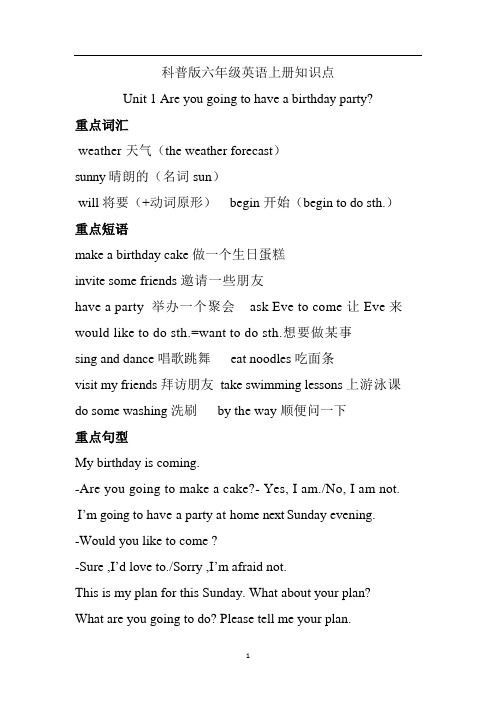
科普版六年级英语上册知识点Unit 1 Are you going to have a birthday party?重点词汇weather 天气(the weather forecast)sunny 晴朗的(名词sun)will 将要(+动词原形)begin 开始(begin to do sth.)重点短语make a birthday cake 做一个生日蛋糕invite some friends 邀请一些朋友have a party 举办一个聚会ask Eve to come让Eve来would like to do sth.=want to do sth.想要做某事sing and dance 唱歌跳舞eat noodles 吃面条visit my friends 拜访朋友take swimming lessons 上游泳课do some washing 洗刷by the way 顺便问一下重点句型My birthday is coming.-Are you going to make a cake?- Yes, I am./No, I am not. I’m going to have a party at home next Sunday evening.-Would you like to come ?-Sure ,I’d love to./Sorry ,I’m afraid not.This is my plan for this Sunday. What about your plan? What are you going to do? Please tell me your plan.May Day/National Day/Christmas /New Year’s Day is coming. On May third, I’m going to help my mum do some washing.The weather is good.Today is my father’s birthday.We are going to have a birthday party for him.Would you like to come to his party?-Sure, I’d love to.The party will begin at four o’clock.I’m asking my uncle and aunt to come to my party.Could I bring him to the party?必考语法一般将来时:表示未来发生的事,常与表示未来的时间的词(tomorrow、the day after tomorrow, next/this/after+时间,in+将来的时间等)连用。
六年级上册英语Lesson 7 课程小结科普版

句型
Let’s read!
The Months of the Year January brings the snow; Makes our feet and fingers glow. February brings the rain, Thaws the frozen ponds again. March brings breezes, loud and shrill, Stirs the dancing daffodil. April brings the primrose sweet, Scatters daisies at our feet.
Americans don't like the number 13, which is considered to be unlucky. 美国人不喜欢数字13,因为13被认为是不吉利的。
Let’s read!
句型
Thirty Days Has September Thirty days has September, April, June and November. All the rest have thirty-one. February is the only one with twenty-eight days on most years and twenty-nine during a leap year.
Let’s read!
句型
May brings flocks of pretty lambs. Skipping by their fleecy dams. June brings tulips, lilies, roses; Fills the children’s hands and posies. Hot July brings cooling showers, Strawberries and gilly-flowers. August brings the sheaves of corn, Then the Harvest home is borne.
六年级上册英语科普段第七课课文

第七课:Solar System1. Introduction1.1 The solar system is a structureprising the sun and the planets that orbit it, along with their moons, asteroids, and other cosmic debris.1.2 It is the center of our universe and a subject of great interest and study for scientists and astronomers.1.3 In this lesson, we will explore the solar system and learn about its variousponents.2. The Sun2.1 The sun is a massive ball of gas and plasma that generates energy through nuclear fusion.2.2 It is the most important celestial body in the solar system, providing light and heat to the planets.2.3 The sun's gravitational pull keeps the planets in their orbits and affects the behavior of other objects in the solar system.3. The Inner Planets3.1 Mercury, Venus, Earth, and Mars are the four inner planets of the solar system.3.2 They are relatively small and made of rock and metal.3.3 Earth is the only planet known to support life, making it a unique and special place in the solar system.4. The Outer Planets4.1 Jupiter, Saturn, Uranus, and Neptune are the four outer planets of the solar system.4.2 They are much larger than the inner planets and areposed m本人nly of gas and ice.4.3 These planets have many moons and are known for their spectacular rings and storm systems.5. Dwarf Planets and Other Celestial Bodies5.1 Pluto was once considered the ninth planet in the solar system but has since been reclassified as a dwarf planet.5.2 There are many other dwarf planets, asteroids, andets that orbit the sun and contribute to the diversity of the solar system.5.3 These objects provide valuable insights into the formation and evolution of the solar system.6. Conclusion6.1 The solar system is a fascinating andplex system that has captured the imagination of humans for centuries.6.2 By studying the solar system, scientists have g本人ned a deeper understanding of the universe and our place within it.6.3 As we continue to explore and learn more about the solar system, we may uncover even more mysteries and wonders w本人ting to be discovered.以上文章是对六年级上册英语科普段第七课课文的一篇介绍,文章中详细介绍了太阳系的组成、太阳、内行星、外行星、矮行星和其他天体,并对它们的特点进行了说明,最后总结了太阳系的重要性和吸引力。
六年级上册英语七课知识点
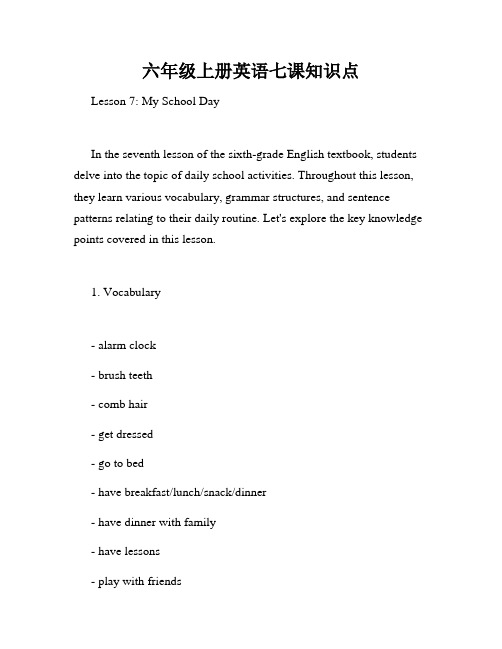
六年级上册英语七课知识点Lesson 7: My School DayIn the seventh lesson of the sixth-grade English textbook, students delve into the topic of daily school activities. Throughout this lesson, they learn various vocabulary, grammar structures, and sentence patterns relating to their daily routine. Let's explore the key knowledge points covered in this lesson.1. Vocabulary- alarm clock- brush teeth- comb hair- get dressed- go to bed- have breakfast/lunch/snack/dinner- have dinner with family- have lessons- play with friends- read a book/newspaper- ride a bike- set the table- take a shower- wake up2. Sentence Patterns- I usually wake up at 7:00.- I brush my teeth and comb my hair.- After getting dressed, I have breakfast.- I usually go to school by bike.- I have lunch at school.- In the afternoon, I have lessons.- After school, I play with my friends.- In the evening, I read a book or newspaper. - I take a shower before going to bed.- On weekends, I have dinner with my family.3. Grammar RulesPresent Simple Tense:- The present simple tense is used to talk about habits, routines, and general truths.- It is formed by adding "-s" or "-es" to the base form of the verb in the third-person singular.Example: He wakes up early.Prepositions of Time:- Prepositions of time, such as "at," "in," and "on," are used to indicate specific times or periods.- "At" is used for a precise time, "in" is used for periods of time, and "on" is used for days and dates.Example: I have breakfast at 7:30.4. Dialogue PracticeThe lesson also includes a dialogue between a student and a teacher, using the vocabulary and sentence patterns introduced in this lesson.Students are encouraged to practice the dialogue with their classmates or in pairs, enhancing their conversational skills and pronunciation.It is important for students to understand and remember these key points as they form the foundation for their English language learning.A strong grasp of vocabulary, grammar, and sentence patterns will enable them to communicate effectively in various daily life situations.By mastering the knowledge points covered in Lesson 7, students will be able to describe their daily school routine fluently and accurately. This enhances their language skills and boosts their confidence in using English to communicate.In conclusion, the seventh lesson in the sixth-grade English textbook focuses on the topic of daily routines and school activities. Through vocabulary acquisition, grammar rules, and dialogue practice, students gain a solid understanding of how to communicate about their daily school day in English. This knowledge equips them with the necessary skills to engage in conversations and express themselves confidently in English.。
六年级上册英语-Lesson 7 课程小结 科普版
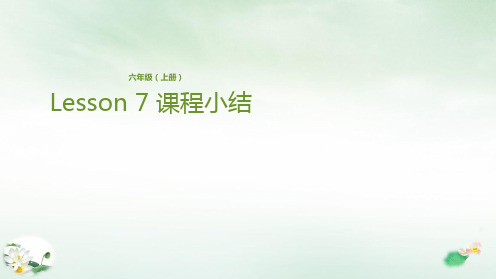
Let’s read!
句型
May brings flocks of pretty lambs. Skipping by their fleecy dams. June brings tulips, lilies, roses; Fills the children’s hands and posies. Hot July brings cooling showers, Strawberries and gilly-flowers. August brings the sheaves of corn, Then the Harvest home is borne.
句型
Let’s read!
The Months of the Year January brings the snow; Makes our feet and fingers glow. February brings the rain, Thaws the frozen ponds again. March brings breezes, loud and shrill, Stirs the dancing daffodil. April brings the primrose sweet, Scatters daisies at our feet.
Let’s read!
句型
Thirty Days Has September Thirty days has September, April, June and November. All the rest have thirty-one. February is the only one with twenty-eight days on most years and twenty-nine during a leap year.
六上英语unit7知识点总结
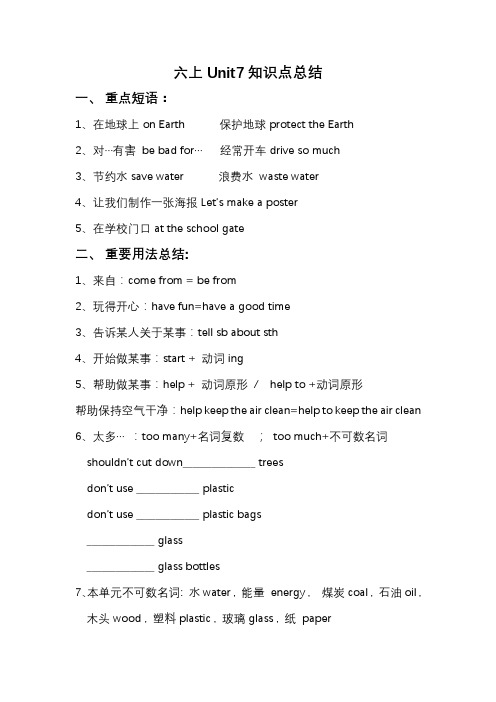
六上Unit7知识点总结一、重点短语:1、在地球上on E arth 保护地球protect the E arth2、对…有害b e bad for…经常开车drive so much3、节约水save water 浪费水waste water4、让我们制作一张海报L et’s make a poster5、在学校门口at the school gate二、重要用法总结:1、来自:come from = be from2、玩得开心:have fun=have a good time3、告诉某人关于某事:tell sb about sth4、开始做某事:start + 动词ing5、帮助做某事:help + 动词原形/ help to +动词原形帮助保持空气干净:help keep the air clean=help to keep the air clean 6、太多… :too many+名词复数;too much+不可数名词shouldn’t cut down_______________ treesdon’t use _____________ plasticdon’t use _____________ plastic bags______________ glass______________ glass bottles7、本单元不可数名词: 水water , 能量energy , 煤炭coal , 石油oil , 木头wood , 塑料plastic , 玻璃glass , 纸paper三、重点语法:1、使用use 再利用reuse 有用的useful使用/再利用某物去做某事:use/reuse sth to +动原使用水去清洗东西:use water to clean things使用木头去制作许多其他的东西:use wood to make many other things使用塑料去制作袋子和瓶子:use plastic to make bags and bottles 再利用纸去制作一个箱子:reuse paper to make a box再利用一个塑料瓶去制作一个玩具:reuse a plastic bottle to make a toy2、should 和shouldn’t 是情态动词,后面要接动词原形。
- 1、下载文档前请自行甄别文档内容的完整性,平台不提供额外的编辑、内容补充、找答案等附加服务。
- 2、"仅部分预览"的文档,不可在线预览部分如存在完整性等问题,可反馈申请退款(可完整预览的文档不适用该条件!)。
- 3、如文档侵犯您的权益,请联系客服反馈,我们会尽快为您处理(人工客服工作时间:9:00-18:30)。
Revision
单词集中营 words
pass /pa:s/ young /jʌŋ/ hair /hɛə/ laugh /la:f/ 传递,经过 年轻的,幼小的 头发 笑
表示食物的单词,你能想到……
• pea 豌豆 • tomato 西红柿 • beef 牛肉 • chicken 鸡肉 • apple 苹果 • pear 梨 • milk 牛奶 • rice 大米 carrot 胡萝卜 potato 土豆 pork 猪肉 fish 鱼肉 banana 香蕉 orange 桔子 bread 面包 noodles 面条
词汇(续) word groups
here you are here it is like them would you like some… laugh at 给你 给你/它在这儿 喜欢它们 你想来点… 嘲笑
同义句集中营
• give sb. sth. = give sth. to sb.给某人 某物 – give me a cake=give a cake to me. – 给我一个蛋糕 • pass sb. sth. = pass sth. to sb.把某物 递给某人 • Pass me that plate= Pass that plate to me • 把那个盘子给我。
重点对话部分
• • • • • • • • • A:Would you like some apples? B:Yes. Pass me an apple, please. A:Here it is. B:Thank you. A:Would you like beef? B:Yes. Give me some beef, please. A:Here you are. B:Thank you.
反义词(续)
• • • • • fat(胖的)————thin(瘦的) sad(悲伤的)————happy(高兴的) hungry(饥饿的)————full(饱的) man(男人)————woman (妇女) boy(男孩)————girl(女孩)
词汇集中营 word groups
make a sentence make another sentence in the sentence in the cakes ask sb to do sth 造一个句子 再造一个句子 在句子里 在蛋糕里 要求某人做某事
句型集中营
由How引导的感叹句
• • • • • • 由How引导的感叹句的结构为: how+形容词+主语+谓语 如:How nice the food is! 这是多么好的食物! How pretty I am! 我多漂亮啊!
祈使句
祈使句无主语,主语you省去; 动词原形当谓语,句首加don’t变否定; 朗读应用降调,句末常标句号或感叹号。 如:有please的祈使句应该这样写 Give me some beef ,please. =Please give me some beef.
语法集中营——可数名词与不可数名词
• 如果普通名词所表示的事物是可以按个数来计算的,这 类名词就叫可数名词。可数名词的复数变化有一定的规 则。 • 1.一般情况下,在名词的词尾直接加s; • 2.以s,ss,ch,sh,x,o结尾的名词,在词尾加es; • 3.以“辅音字母+y”结尾的名词,先将y变为i,再加es。 • 4.特例: •) • woman——women(女人)child———children(儿童)
重点对话部分
• • • • • • • • A:Is your mother tall or short? B:She’s tall. A:Is she fat or thin? B:She’s thin. A:Is she young or old? B:She’s not young, but not very old. A:Is her hair long or short? B:Her hair is short.
反义词集中营
• • • • • • • •
beautiful(美丽的)————ugly(丑陋的) pretty(漂亮的)————ugly(难看的) tall(高的) ———— short(矮的) long(长的) ———— short(短的) young(年轻的)———— old(年老的) new(新的) ———— old(旧的) big(大的)————little(小的) big(大的)————small(小的)
• Is it long or short? • It is long .
• 句子开头首字母要大写 • Are you happy or sad? • I am happy .=I’m happy.
Class Over!
Goodbye,students!
祈使句的否定句
• 祈使句的否定形式:动词前加don’t。 • 如: Don’t be afraid. 不要害怕。 • 例: • Give me hot dogs.(改为否定句) • Don’t give me hot dogs.
一般疑问句的选择疑问句
一般疑问句+or+一般疑问句 后一个疑问句常用简略式,即后一个一般疑问 句与前一个疑问句相同的部分常省略。例子: Are you in Class Three or Class Four? 将下列两个句子合并为一个选择疑问句,并根 据括号里的词作出回答。 1. Is it long? Is it short? (long) 2.Are you happy? Are you sad? (happy)
• 如果普通名词所表示的事物是不能按个数 来计算的,这类名词就叫不可数名词。常 指物质名词食物(food)如:meat,beef, fish,pork,chicken,soup, bread, rice,water,milk,orange,tea。简称 肉,汤,面,水。不可数名词的复数与单 数一样。另外hair(头发)也是不可数名 词。
